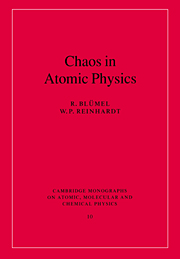Book contents
- Frontmatter
- Contents
- Preface
- 1 Introduction
- 2 Chaos: tools and concepts
- 3 Chaos in classical mechanics
- 4 Chaos in quantum mechanics
- 5 The kicked rotor: paradigm of chaos
- 6 Microwave-driven surface state electrons
- 7 The hydrogen atom in a strong microwave field
- 8 The kicked hydrogen atom
- 9 Chaotic scattering with CsI molecules
- 10 The helium atom
- 11 Chaos in atomic physics: state of the art and research directions
- References
- Index
1 - Introduction
Published online by Cambridge University Press: 14 September 2009
- Frontmatter
- Contents
- Preface
- 1 Introduction
- 2 Chaos: tools and concepts
- 3 Chaos in classical mechanics
- 4 Chaos in quantum mechanics
- 5 The kicked rotor: paradigm of chaos
- 6 Microwave-driven surface state electrons
- 7 The hydrogen atom in a strong microwave field
- 8 The kicked hydrogen atom
- 9 Chaotic scattering with CsI molecules
- 10 The helium atom
- 11 Chaos in atomic physics: state of the art and research directions
- References
- Index
Summary
By now the “chaos revolution” has reached nearly every branch of the natural sciences. In fact, chaos is everywhere. To name but a few examples, we talk about chaotic weather patterns, chaotic chemical reactions and the chaotic evolution of insect populations. Atomic and molecular physics are no exceptions. At first glance this is surprising since atoms and molecules are well described by the linear laws of quantum mechanics, while an essential ingredient of chaos is nonlinearity in the dynamic equations. Thus, chaos and atomic physics seem to have little to do with each other. But recently, atomic and molecular physicists have pushed the limits of their experiments to such high quantum numbers that it starts to make sense, in the spirit of Bohr's correspondence principle, to compare the results of atomic physics experiments with the predictions of classical mechanics, which, for the most part, show complexity and chaos. The most striking observation in recent years has been that quantum systems seem to “know” whether their classical counterparts display regular or chaotic motion. This fact can be understood intuitively on the basis of Feynman's version of quantum mechanics. In 1948 Feynman showed that quantum mechanics can be formulated on the basis of classical mechanics with the help of path integrals. Therefore it is expected that the quantum mechanics of an atom or molecule is profoundly influenced, but of course not completely determined, by the qualitative behaviour of its underlying classical mechanics.
- Type
- Chapter
- Information
- Chaos in Atomic Physics , pp. 1 - 28Publisher: Cambridge University PressPrint publication year: 1997

